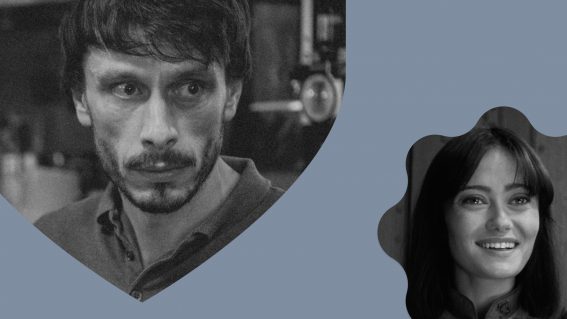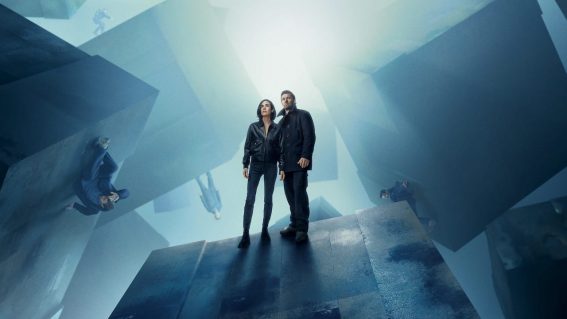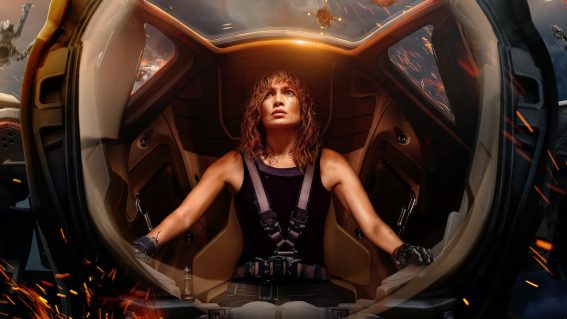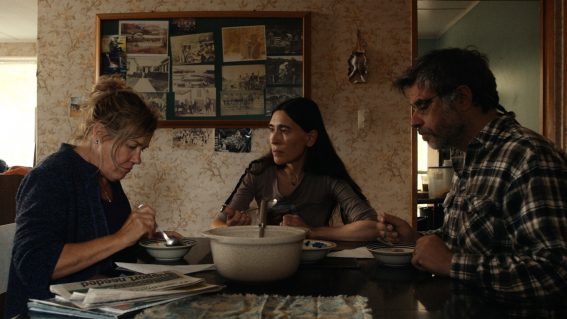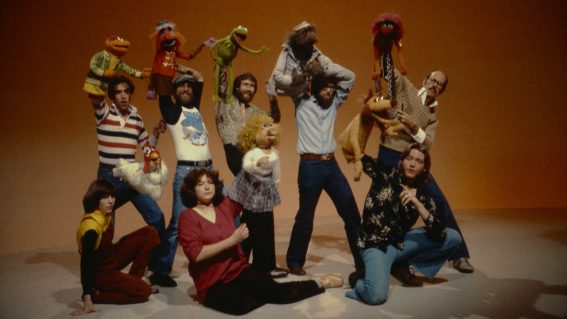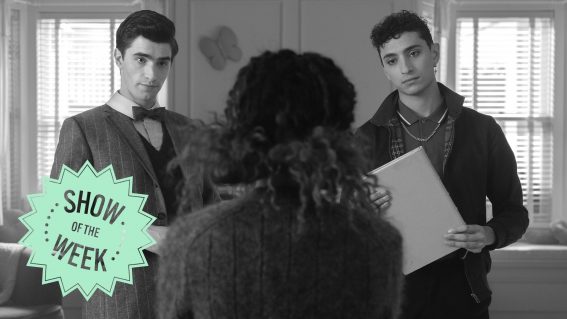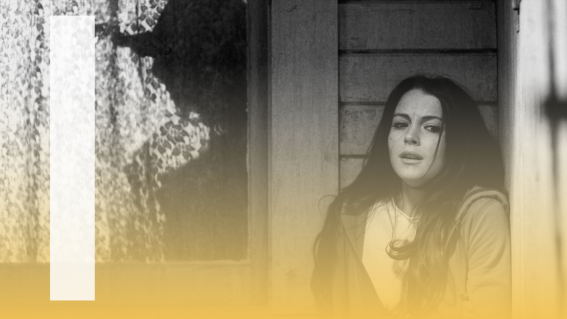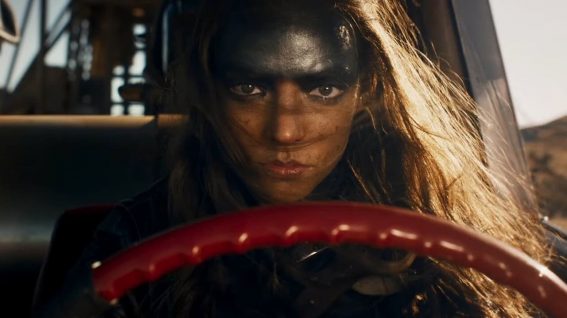Interview: Brandon Cronenberg, writer and director of ‘Antiviral’
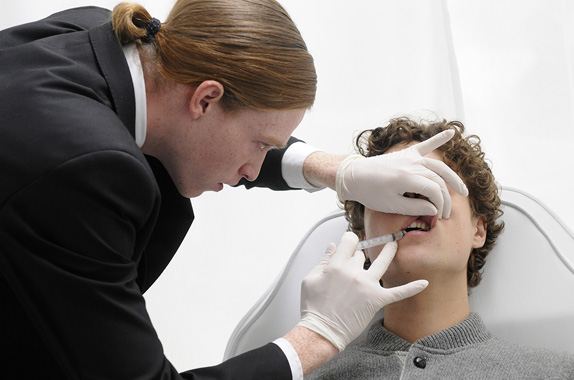

Antiviral is a sci-fi horror thriller, the debut feature by Brandon Cronenberg – yes, son of David. The film won Best First Feature at Toronto Film Festival 2012 and was warmly received at a number of festivals worldwide including Austin’s awesome Fantastic Fest. Antiviral follows Syd (Caleb Landry Jones), an employee at a clinic that sells injections of viruses harvested from sick celebrities to obsessed fans. Syd also supplies illegal samples of these viruses to a black market, smuggling them from the clinic in his own body. When he becomes infected with the disease that kills superstar Hannah Geist (Sarah Gadon), Syd becomes a target for collectors and rabid fans and must unravel the mystery surrounding her death before he suffers the same fate. I spoke to Brandon about Antiviral and started, like most interviewers apparently did, by asking about being a Cronenberg.
Your surname must have generated a heightened level of interest in your film. I’m sure it is something that gets brought up in most of your interviews – is it annoying to talk about this?
It’s something I’ve kind of come to terms with because it’s been that way since before I got into film. I think it comes with the territory. I felt when I got into film-making, the only way I could really function was by deciding to ignore my father’s career as much as possible and not worry about what people were thinking. So none of that really bothered me. But now that I’m doing all this publicity everyone keeps asking me if I should be feeling some kind of really particular pressure because of who my father is. And, now, I’m getting worried because it feels like I should be feeling this, but I’m not.
“Oh, why am I not feeling this?”
Yeah. Now I’m worried about it. I don’t know. Like I said, I guess maybe I’m meant to be feeling some kind of pressure.
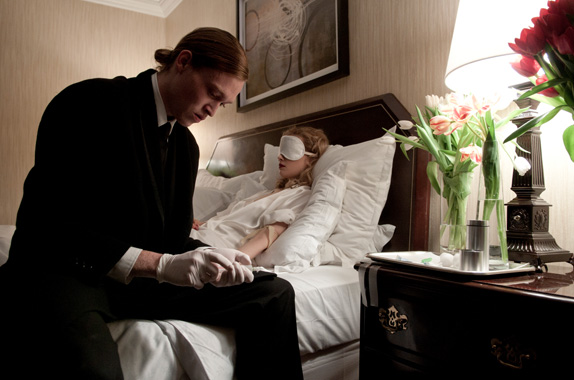
When did you decide that film-making was something that you wanted to pursue? I guess you would have had a bit of a different kind of perspective on it from the Average Joe.
I didn’t get into it until I was about 24 years old. I think partly because… well, probably because I wasn’t a huge cinephile growing up. I was sort of doing a bunch of scattered, creative things, I guess. I making visual art, doing some illustration and painting, and then I was writing, and I wanted to be a novelist, and then I was playing in bands and I started realizing that you can’t really reasonably get good at all of those things because any one of them is something you could dedicate your whole life to. And, so, I thought that I needed to focus on something and film seemed like a way of collecting those interests into one platform that I could dedicate my life to and fully get good at.
I guess of all those different individualistic things you could have chosen to pursue, you’ve chosen the one which involves being a manager of quite a lot of people. What was that like?
It was weirdly fine. Like I’m actually, really introverted and I would have assumed that that would be a huge problem for me, but I when you get to the point where you’re actually working with all those people, you’re so busy that you don’t have time to worry about it. So, yeah, I didn’t. I think there was just too much going on for me to really worry about it or think about it in those terms.
As a first time feature director, were there a few key people in your crew that you could really trust to take on aspects of it for you?
Yeah, quite a few. I mean, my producer was Niv Fichman, who’s a very experienced producer in Canada and was a sort of mentor figure. He stood out to me because he was making a series of first time feature films. Hobo with a Shotgun was the first film in this series and mine is the third. His idea was to take first time directors and give them some reasonable resources for a first film – he’s very good at matching people. Most of the key crew were people that I got along very well with. We all became good friends since working together and so it’s easy to trust those people because they all very smart people and talented filmmakers.
How advanced was the idea for ‘Antiviral’ when you first started talking? Was it developed after conversations with the producer started, or something that was quite close to being ready to go as an idea?
I wrote it over the course of about eight years and I think the initial idea was fairly well developed and maybe the first half of the script was very polished by the time I was speaking with Niv but I was still writing the script into pre-production.
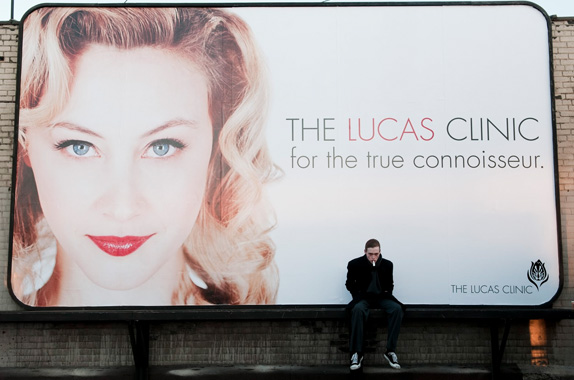
Has the nature of celebrity changed much over that eight year period then?
I think it hasn’t changed fundamentally, but I think certain aspects of celebrity culture that were becoming apparent when I started writing have really become much more central to that industry. You know, when I was starting to think about this, people were still talking about Paris Hilton, and using the term, “famous for being famous”. I think she was a prime example in her prime of someone who’d become famous just for being famous, and her job was to be famous and that was it. It wasn’t connected to any form of accomplishment. It was just a huge critical mass of visibility.
But, I think, since then the celebrity industry has really become more and more considered and it’s really focused on producing fame in a way that that’s not connected to accomplishments. I mean, you certainly have musicians and movie stars that are very famous. But you have this whole new kind of fame or people become famous for being on reality television just living their lives and it’s been mass production of celebrities. People became famous for no particular reason for about a year and that’s their job. It’s being famous for a year or two years and then they sort of move on so that other celebrities take their places. So, I think that’s much more pronounced than it was back when I started writing. In the film nobody is famous for any stated reason in entertainment. It’s just celebrity news. So, it has really reached the far extreme where it just becomes about the interest in people and there’s no artistic element to them. There’s no creative element or political dimension or any other reason people get famous.
I liked that the attitude to celebrity in the film wasn’t seen as behavior that is extreme. It was quite normal and banal even while the ways that characters engaged with celebrity – like eating cloned meat – became more out there.
I think that side of culture is so completely insane and everyone kind of takes it as being commonplace. The thing is, it’s a little weird but also makes sense because of how it’s everywhere and how we’re used to it. So, I figured that the world of the film had to function that way also with the celebrity steaks and the skin grafts.
I was reading an article about actually growing meat, which is a thing. And technology being developed to ultimately try and make something that can be grown and doesn’t require farming livestock. It’s more efficient. But because it’s all based on dividing muscle cells and growing them in a nutrient-rich environment, it would be just as possible to do that with human muscle cells.
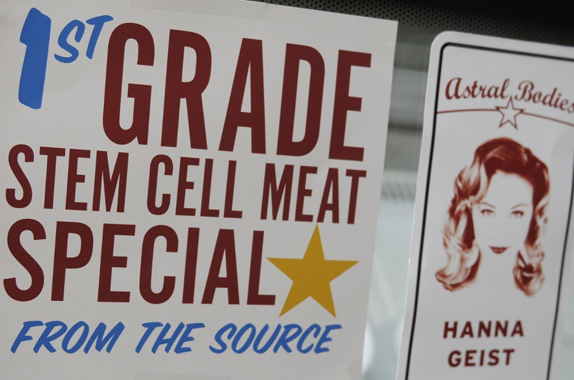
If you ate celebrity steaks, who would you like to eat?
Well, we’re vegans, so…
That’s a good answer.
Although, you know what, I would eat human steaks if it was consensual.
There’s some striking visual elements to the film. Were these sequences and aspects things that you planned to include from an early stage?
Actually the prosthetic face was probably the one that had come to me beforehand. That whole sequence was based on some drawings and a sort of style of drawing that I had done, something I was interested in including in this film. The rest of it just kind of came through the writing process and the film making process.
Was it satisfying to work something that you’d done previously into a feature film?
Yeah, it was great. The process is so incredibly different. It’s all very indirect. When you draw, one of the good things about drawing is that it’s right there. It gets you putting your pencil on the page and just making it in front of you in the most direct way possible. But film is interesting because you’re collaborating with people and you actually see those ideas if the people you’re collaborating with are good. I like to see those ideas being processed through other people’s talent. It’s pretty exciting.
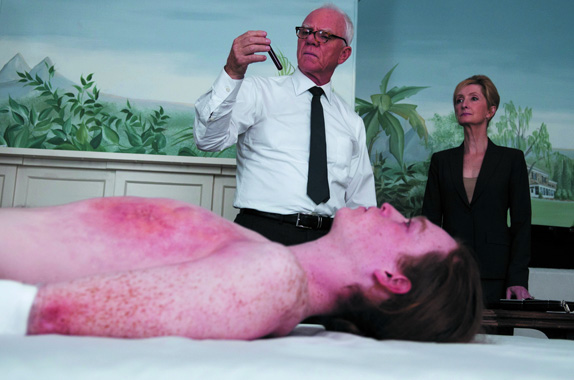
Caleb Landry Jones’ performance is obviously very critical to the film working as well as it does. Did he bring anything to the film that took it in a different direction to how you thought it was going to go?
Well, the character was originally written as someone older, someone in their 30’s. But then we saw clips from movies Caleb had been in and checked out his work. I mean, I think he’s so good. I think he’s a really exciting actor and just wanted to plug into that. It’s better to find someone who’s really exciting but different from what you’d originally imagined than to just sort of try and find someone who’s exactly like what you were thinking. And, then, in this case I think that strategy proved extremely effective because Caleb brought all of this stuff to the film. He’s very intense, he’s a very nuanced and physical actor, and so we were able to go to much more physical extremes in the way he carried himself and his physicality. I think it became more central to the character than it would have with a less physical actor.

